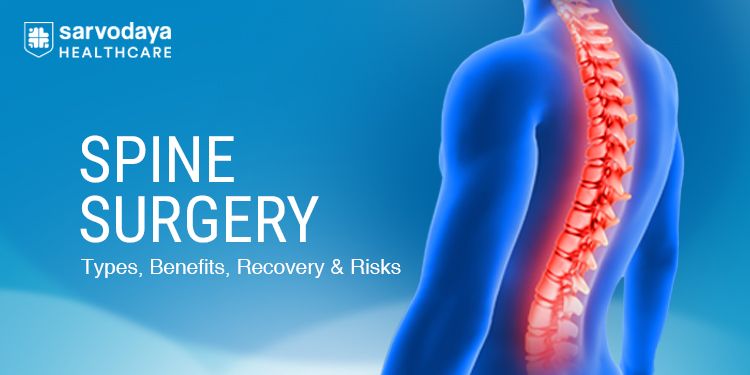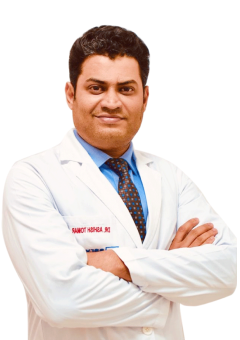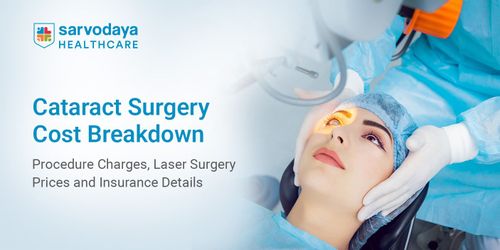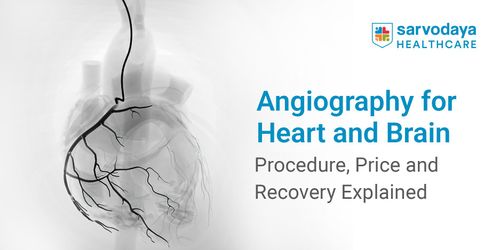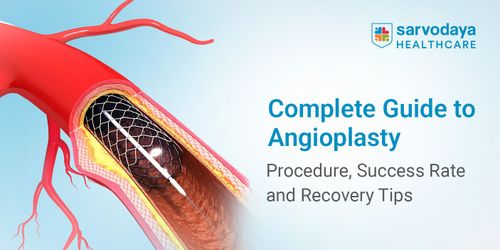Spine is one of the most vital structures in the human body, on which hinges most of our limb movements and functioning. The most common symptom of a spinal disorder is back and/or neck pain. In severe and untreated cases, the patient might have weakness in the hands and legs, inability to perform daily activities, bladder/bowel impairment, breathing difficulties, numbness in the limbs. The normal function of the spine might be disrupted due to degeneration, abnormal loading/bending, infection, tumour and trauma.
Not all spinal ailments require surgery. Normally, 90% of symptomatic patients having degenerative spine disease will not require surgery. They can easily be treated by oral medications, physiotherapy and back strengthening exercises. Patients not relieved can be given pain blocks in the form of targeted injections. Only when all these therapies fail to give relief, spine surgery is recommended to the patient.
Spine surgery in degenerative disease and trauma is usually done to decompress the nerves and stabilize the spine. Otherwise, surgery is done to remove tumours of the spine, diagnose and treat infections like tuberculosis and sometimes to take biopsy for accurate diagnosis. However, spine surgery should be recommended and performed only by a qualified spine specialist.
Types Of Spine Surgery:
Spine surgery types include:
- Traditional open surgery
- Navigation assisted spine surgery
- Minimal invasive spine surgery
All these surgeries can be done via posterior, lateral and anterior approaches.
At Sarvodaya Hospital, we offer the following spine surgery procedures
- Deformity correction: scoliosis surgery
- Cervical spine surgery
- Cervical disc replacement
- Dorsal and lumbar decompression procedures
- Spinal instrumentation and fusion procedures
- Guided foraminotomies
- Lumbar disc replacement
- Minimal invasive spine surgeries
- Baclofen pump implantation
- Spinal cord stimulator implantation
Benefits Of Spine Surgery:
Advancement in medical technology with the advent of NeuroNavigation systems and better operating microscopes have opened several avenues to treating spine disorders that were previously considered inoperable or too difficult to approach surgically.
Minimally invasive surgeries can be done with advanced Tubular Retractor Systems, Endoscopes, Percutaneous Instruments and Implants. However, not all surgical approaches are beneficial for all patients. The surgery is tailored by the spine specialist after assessing each patient specifically and expected benefits and risks.
The benefits of spine surgery may include:
- Long-lasting relief from severe pain
- Increased mobility with comfort
- Better quality of life with a better functioning spine
- Ease in performing activities for a longer time duration, post-surgery
- Improved physical fitness
- Reduced consumption of pain-relieving medications
- Improved range of motion & movement
- Lack of restrictions in activities after complete recovery
- Faster recovery with minimal pain in case of minimally invasive surgery
- Less chances of infection, as surgery is usually performed through a tiny incision
Successful spine surgery helps a patient to get back to work with better and increased productivity. A pain-free back equals a more productive and energetic lifestyle, which can motivate people to face all challenges in life.
Recovery After Spine Surgery:
The recovery period after spine surgery plays a vital role. To bring out the best results, the spine specialist will give some instructions which one needs to follow diligently. These instructions play an incredibly significant role in recovery. Depending on the type of procedure performed and the severity of the symptoms, the duration of recovery may vary. Recovery depends largely on the pre-operative status of the patient i.e. a patient with profound weakness may recover only partially whereas a patient who comes early in the course of his disease is expected to make a complete recovery. It was a taboo previously to have spine operated. However, increasingly satisfied, and completely cured patients bear testimony to the fact, that in expert surgical hands, most of the spinal disorders are completely curable and the patient can lead a better life after surgery.
With the advent of minimally invasive approaches, the patient can start doing his/her routine activities the very next day after surgery and over the next few days can get back to his normal life with as minimal discomfort as possible.
Risks Associated With Spine Surgery:
There was a time when spine disorders were considered out of bounds for surgeons. However, with a better experience and improved technology, things have changed. There are some inherent risks associated with any spine surgery which needs to be taken into account and every decision rests on the principle of Risk vs Benefit.
The usual risks associated are:
- Infection at the surgical site (now very rare)
- Less than adequate pain relief
- Less than adequate relief in limb weakness
- Recurrent disc herniation necessitating revision surgeries
- Implants breakage or screw loosening
- Nerve damage resulting in temporary/permanent limb weakness (very rare)
- CSF leak from the surgical site
Thankfully, these complications are rarely encountered and can be adequately managed at our spine surgery hospital.


